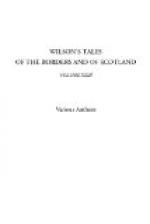No sooner had the disabled soldier crossed the river, and entered the narrow lanes overshadowed by dark hedges of hazel, than he burst into tears, and his first words were, “Caroline, I will remember thee!”
It was near midnight when he approached the house which he called his home. The inmates were asleep. He tapped at the window, the panes of which were framed in lead after the form of diamonds.
“Who be there?” cried an angry voice.
“Your son! your son!” he replied. “George!”
“Zon!” repeated the voice; “we have no zon. If it be thee, go to Coomberland, lad. We have noughts to do with thee. Thy old grandfather, Zquire Morris, be now dead, and he ha’n’t paid us so well for what we have done as to have oughts to zay to thee again; zo good night, lad.”
“Father! mother!” cried George, striking more passionately on the window, “what do you mean?”
“Whoy, ha’n’t I told thee?” answered the voice that had spoken to him before. “Thou art no zon of ours. Thou moost go to Coomberland, man, to Zquire Morris—to his zeketors,[*] I mean, for he is dead. They may tell thee who thou art; I can’t. We ha’n’t been paid for what we have done for thee already. However, thou may’st coom in for t’night;” and as the old man who had professed to be his father spoke, he arose and opened the door.
[note *: Executors.]
George entered the house, trembling with agitation.
“Father,” he said—“for thou hast taught me to call thee father; and if thou art not, tell me who I am.”
“Ha’n’t I told thee, lad?” answered the old man. “Go to Coomberland; I know noughts about thee.”
“To Cumberland!” exclaimed George; and he thought of the young officer whom he had twice met, who belonged to that county, and whose features were the picture of his own. “Why should I go to Cumberland?”
“Whoy, I can’t tell thee whoy thou shouldst go,” said the old man; “but thou was zent me from there, and there thou moost go back again, vor a bad bargain thou hast been to me. Zquire Morris zent thee here, and forgot to pay for thee; and if thou lodgest here to-night, thou won’t forget to be a-moving, bag and baggage, in the morning.”
George was wearied, and glad to sleep beneath the inhospitable roof of those whom he had considered as his parents; but on the following morning he took leave of them, after learning from them all that they knew of his history.
But I must again leave him, and return to Colonel Morris, and his son Charles.
They came to England together, and hastened towards Morris House; and there the long disowned son learned that his father was dead, and that his mother and his sisters knew not where his child was, or what had become of him. But his kindred had ascertained that he was now rich, and they repented of their unkindness towards him.
“Son,” said his mother, “I know nothing of thy child. Thy father was a strange man—he told little to me. If any one can tell thee aught concerning thy boy, it will be John Bell, the old coachman; but he has not been in the family for six years, and where he now is I cannot tell, though I believe he is still somewhere in the neighbourhood.”




